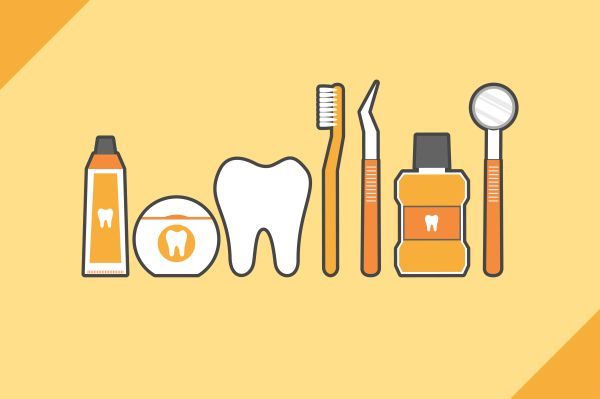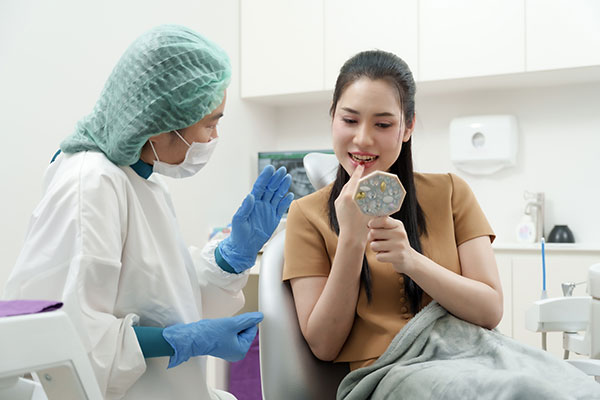How Flossing Can Help with Your Bad Breath

Looking for motivation to floss your teeth at least once daily and ditch bad breath? Flossing every day helps manage bad breath by eliminating the food debris and bacteria that aid it. This makes flossing one of the most convenient ways to stop bad breath.
Bad breath, also called halitosis, is actually more rampant than many people think. You can make jokes about lousy breath, whether it is yours or someone else’s, but it is a noteworthy dental health problem. Bad breath is sometimes more than an awkward social issue; it could be a symptom of disease or ill health.
Bad breath causes
Reduced production of saliva
A decreased amount of saliva in your mouth can make you more vulnerable to plaque accumulation, which can cause an unfriendly odor in your breath. Pay more attention to some of the following situations that decrease saliva production in the mouth and cause bad breath:
- Alcohol consumption: Alcoholic beverages can contribute to dry mouth and cause halitosis. Therefore, remember to floss and brush after your evening time out, regardless of how much you want to slip into bed and ignore it.
- Early mornings: When you are sleeping, saliva flow reduces significantly. This causes the dreaded morning breath. This simply means in the morning after waking up is probably the best time to perform your daily dental cleaning habits.
- Hunger and thirst: When you feel dehydrated, the amount of saliva in your mouth has reduced significantly, which predisposes you to bad breath and high accumulation of bacteria. Drink enough fluids, and do not forget to floss. Besides, note that chewing food promotes saliva production in your mouth, which means if you are not eating correctly or dieting, you may be inviting lousy breath.
- Dieting: If you are eating less regularly or dieting, a mint floss will not only help alleviate bad breath by eliminating bacteria, it will also assist with your nutrition by giving your mouth a fresh taste that makes you less drawn to snacking. People following a strict low carbohydrate diet also sometimes deal with bad breath, but the instances are just circumstantial.
If you are eating low-carb meals or any restrictive diet, you may be contributing to bad breath. If you have to limit your food consumption and eat irregularly, drink lots of water to help maintain a decent level of saliva in the mouth, avert bad breath and contribute to an excellent dental care regimen.
The importance of flossing
Multiple studies have proven the association between lack of flossing (among many other poor oral hygiene habits) and bad breath. In a survey conducted on over 1000 adults in Kuwait, cases of bad breath were repeatedly common with those who have never used dental floss, those who brush irregularly and those who smoke or have been smokers.
Your dental hygiene regimen, if you want to prevent bad breath, should including daily flossing and brushing the teeth, gums, tongue and roof of your mouth at least twice daily. Using a dental wash can provide temporary relief for bad breath, but only use it as a compliment, not a substitute for brushing and flossing.
Request an appointment here: https://www.sacramentosleepdentist.com or call Dental Excellence of Greenhaven at (916) 293-0504 for an appointment in our Sacramento office.
Check out what others are saying about our services on Google: Read our Google reviews.
Recent Posts
A dental crown, custom-made and designed to fit snugly over a tooth, addresses a range of dental concerns, from tooth replacement and protecting a weakened tooth to enhancing the appearance of your smile. Whether dealing with decay, damage, or cosmetic imperfections, this restoration offers a tailored solution. With its many applications, the dental crown is…
Dental crowns are among the most highly versatile restorations, serving both restorative and cosmetic purposes. They can both save teeth as well as help dentists replace missing ones. These restorations have been one of the most popular and effective dental restorations for decades. Here are some common ways dentists use dental crowns to restore and…
Dental crowns are caps that cover and replace natural tooth structures to restore their shape, function, and appearance. They are a popular restorative treatment that can address various dental issues. By investing in dental crowns, you are not only restoring the look of your smile, but you are also safeguarding the future of your oral…
For many people, dental anxiety is a significant barrier to getting the care they need, leading to more serious oral health issues. This fear or stress around dental visits can range from mild nervousness to intense apprehension, making it hard to schedule an appointment. However, understanding dental anxiety and learning how to manage it can…


